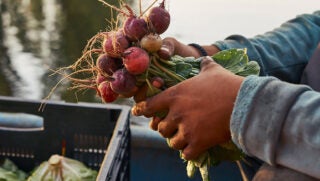Commonwealth Charter Academy, a Pennsylvania public cyber charter school, officially unveiled AgWorks at CCA, the largest public educational aquaponics facility in the country. AgWorks at CCA will provide students with hands-on learning experiences in a 6,100-square-foot, state-of-the-art controlled environment agriculture center located at CCA’s Capital Campus in Harrisburg.
This living, learning laboratory, funded through a federal grant, is one more tool CCA uses to teach about and train students for careers in various fields including agriculture, environmental science and trades, through curriculum and partnerships with local businesses. Under the guidance of teachers and horticulture experts, students will manage the AgWorks at CCA facility by growing and maintaining nearly 3,000 plants and approximately 400 fish, all while learning about aquaponics, hydroponics, and aeroponics. Students also will have access to three labs to conduct scientific experiments in the areas of research, genetics, and culturing tissue.
As a public school, CCA is committed to communities across Pennsylvania — educating and developing students into responsible and productive citizens after high school graduation and working with the community by making CCA accessible for others as well. AgWorks at CCA is open for other schools, universities, and nonprofit organizations to tour and participate in a variety of educational activities.
“Professionally working in the field of aquaponics is what I want to do for a career,” said Nathaniel Saxe, an 11th-grade CCA student. “This facility is just incredible. What CCA is offering me in high school is something that most colleges aren’t capable of. I’m able to gain more knowledge now and better prepare myself for a career.”
According to the Pennsylvania Department of Agriculture, Pennsylvania provides nearly 500,000 agriculture and food-related industry jobs across the commonwealth. Between now and 2025, there will be 75,000 new and replacement job openings in Pennsylvania for agriculture and food careers.
“It’s important that the next generation has a vested interest in agriculture so that we can continue to grow sustainable produce for future generations,” said Samantha Johnson, director of aquaponics programs at CCA.
Students will have the opportunity to grow and harvest organic fruits, vegetables and herbs including avocados, bananas, lettuce, microgreens and basil. They also will have the opportunity to raise and maintain tilapia, koi and prawn, which play an important part in the aquaponics life cycle. The produce harvested at AgWorks at CCA is already being donated to feed local communities or sold to retailers and restaurants including the Hilton Harrisburg.
“In order to know how to prepare students with the education and skills they need for careers, we as educators must work with the business community to identify where the workforce is headed,” said Tom Longenecker, COO of CCA. “With AgWorks at CCA, we are identifying partners statewide that want to contribute to a student’s education by helping to advance it through real-life experiences, because we know that the jobs of today will not necessarily be the jobs of tomorrow — that is why students need to prepare now.”
The AgWorks at CCA facility is a sustainable, zero-waste ecosystem. It uses fish to fertilize plants, resulting in higher yields of produce than traditional agriculture. Bio-controls are used in place of pesticides, ensuring that the GMO-free produce is free of contaminants. Solar panels located on the roof of CCA’s Capital Campus supplies 100 percent of the energy needed to power the AgWorks at CCA facility.
The unveiling of the facility was attended by CCA students and faculty, elected officials, business leaders and community partners. The event included a ceremonial harvest, tasting and tours of the facility. A donation of 300 leafy-green vegetables was also made to the Central Pennsylvania Food Bank.


